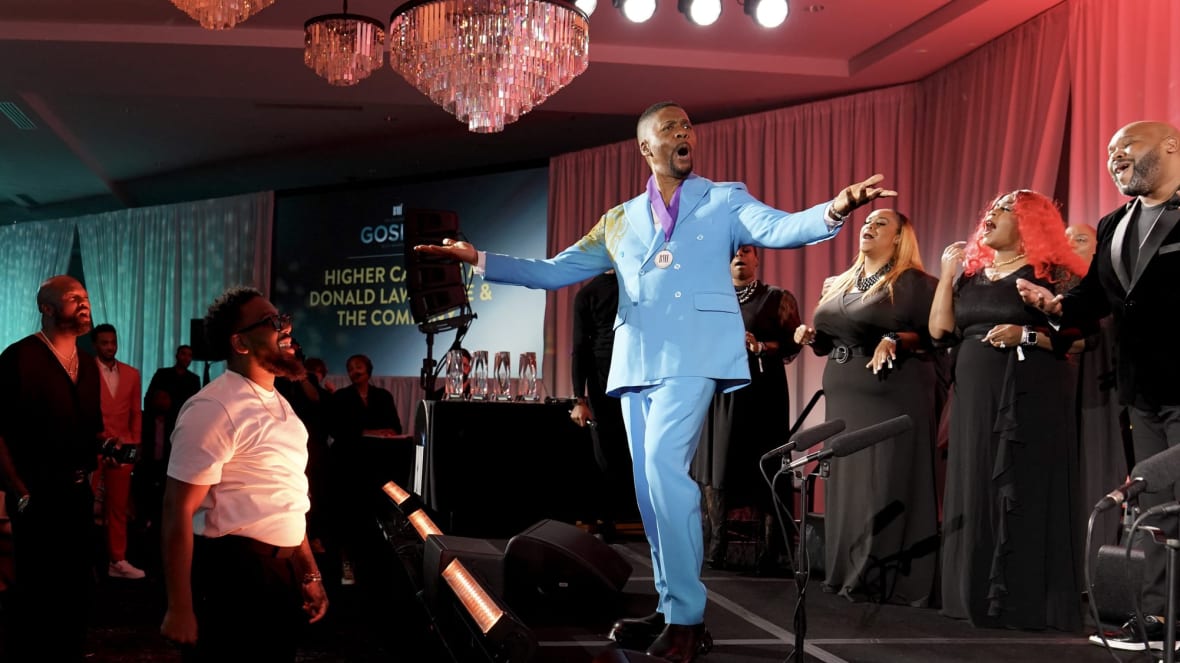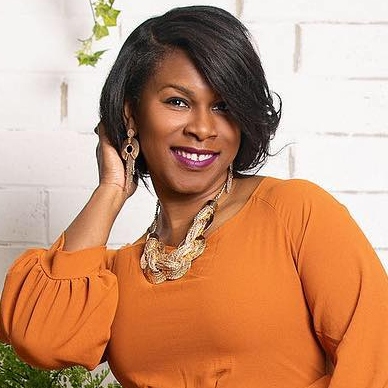Notes on faith: What does it mean to ‘enlarge my territory’?
Popularized by gospel musician and educator Donald Lawrence, the phrase “enlarge my territory” is the antithesis of me-centered thinking, demanding we share the wealth.
“Notes on faith” is theGrio’s inspirational, interdenominational series featuring Black thought leaders across faiths.
Bless me, bless me
Oh Lord, bless me indeed
Enlarge my territory
Oh Lord, bless me indeed
(I pray for increase)
Bless me indeed
(I pray for increase)
Increase, increase
Oh Lord, bless me indeed
Enlarge my territory
Oh Lord, bless me indeed
(I pray for increase)
Bless me indeed
(from “Bless Me” (2002) by Donald Lawrence)
“Enlarge my territory…” At a glance, some listeners might imagine these popular song lyrics as another example of shallow, me-centered, prosperity-gospel theology readily associated with evangelical Christianity. The kind of song one might imagine being sung by someone concerned with amassing wealth, material goods, and prominence, with little concern or direct action for their neighbor’s needs. But when I think of composer Donald Lawrence’s professional track record as a successful mentor and educator, I hear this song as the meditation of one who is “blessed to be a blessing.”

The perspective offered in these popular lyrics from Lawrence’s “Bless Me,” inspired by the widely published “prayer of Jabez” (1 Chronicles 4:9-10), prompts me to ask the question: In what ways are we blessed to be a blessing? What does it mean to enlarge our territory?
In a society where many of us are redefining legacy beyond what we leave to our blood heirs, discovering and pursuing other progeny is an important conversation. We can use wisdom from Maestro Lawrence’s mentorship strategy as an inspirational text for our lives in how he has established his own work, collaboration, mentorship, and continuing our elders’ legacy.
An established body of work
Largely due to his mentorship experiences, Lawrence, a Grammy award-winning composer, producer, clinician, and professor, is a musician’s musician, having studied with and written for the best in the entertainment industry. As a theologian and educator myself, over the years, I’ve observed his navigation as both a mentor and mentee, constantly evolving his institutional knowledge and protecting our culture.
A gospel-choir head to the core, I first encountered Lawrence as a teenager through his albums: “A Songwriter’s Point of View” (1993) and “Bible Stories” (1995). So many favorites on those albums, and I can tell you that my church’s youth & young adult choir and Children of the Gospel (COTG) of the Washington Performing Arts (WPA) wore out many of his songs — “Glory, Glory” featuring Stephanie Mills (1993) got a lot of mileage from us, with “choirography” and all.
Mentorship and collaboration
Years later, when I moved to Chicago, I’d see Lawrence around town as a music director and collaborator at various A-list recordings for music artists across genres like Chicagoans Lalah Hathaway and Sir the Baptist, Kelly Price, Faith Evans, and The Clark Sisters. I would also see him guiding the various Stellar award-winning artists featured on his albums, including Anita Wilson, Sheri Jones-Moffett, Ted Winn, and DeWayne Woods, ensuring they understood the politics of the entertainment industry as both acclaimed worship leaders and recording artists.
For example, I watched Lawrence educate his mentees on how to become members and participate in the governance of the Recording Academy (parent organization of the Grammys). Unfortunately, as in other professions, the “crabs-in-a-barrel” mentality prevents many gospel artists, already producing music in a marginalized part of the industry, from sharing crucial information about guild membership, career sustainability, and promotion that would increase their value in the global marketplace.
So, as a music researcher, imagine my delight when I would make Lawrence’s acquaintance while breaking bread with music industry colleagues in Chicago. I had so much I wanted to ask him, but I’ve learned that when you are in the presence of one you admire, it is best to listen more than speak. At the time, he taught courses on the music industry at Columbia College and was full of insights. Beyond his extensive accomplishments in gospel, I learned about his work with Broadway legends and vocal coaching music groups like En Vogue.
Carrying the Culture
I was later reintroduced to Lawrence from another angle, just before the passing of his close friend and mentor, the legendary Dr. Edwin Hawkins, co-composer of gospel crossover hits like “Oh, Happy Day!” (1967) and “Thank you, Lord! (1989). Amid a significant loss, he tenderly facilitated the transition of the annual Hawkins Music and Arts Global Seminar, encouraging attendees to plan for futuristic and international reach. At that point, we began to conspire together about and envision what forward-thinking music education for gospel artists might look like.
Lawrence is now the new convener of the seminar, relaunching in London, England this month and continuing a decades-long tradition of musical mentorship among gospel artists as a global art form. Established by Lawrence’s mentor Hawkins and his brother and collaborator, Bishop Walter Hawkins, this year, Lawrence anticipates over 15 worldwide delegations to join in global music and arts training. Together, Lawrence and the seminar leadership are committed to continuing the wishes of the convening’s founders, carrying the vision as though it is their own.
Here we find a crucial life lesson about the depth of the responsibilities that come with enlargement of one’s territory — that of caregiving for our chosen family of beloved elders and institutions they’ve established. Many of us in the industry watched Lawrence and the music and arts leadership community settle his mentor’s affairs with transparency, discretion, and deep reverence for his legacy, accepting the challenge to continue that legacy by creating new projects. Lawrence took up the mantle of spokesperson, calling his community to consider final wishes to secure the organization for the future instead of seeing it fall to the wayside like many others.
These end-of-life arrangements are not new — and yet, too often, we do not discuss the circumstances and challenges, perhaps due to shame of having found ourselves in these situations without the knowledge or confidence about how to help others without putting ourselves in a bind. Many of us simply observe the challenge, learn the lesson, and store the information for our own legacy, essentially hoarding it for ourselves for that me-centered comfort. However, what better time to put our knowledge and business acumen to work if it is not for our loved ones and community, those who have inspired us to be the very best at what we do? We are their wildest dreams, tasked with carrying the torch as though the dream is our own.
To me, the most impressive aspect of Lawrence’s professional and personal reputation is living a life that is the working definition of “enlarge my territory”; one in which the blessings we receive are to be multiplied, stewarded well, and sustained and shared with those who come after us. Being positioned to enlarge requires us to be simultaneously teachable and instructive, enlisting in a life of well-rounded growth and poised to replicate ourselves and our knowledge so that vision does not die with us. “Enlarge my territory” demands that we attend to those in our proximity, ensuring everyone in our crew eats. It also means we have an eye toward global impact and significance.
I had the opportunity to ask Lawrence what the lyrics of “Bless Me” mean to him. Directing his words to God, he responded: “Awaken me that I may see your plan for me from a wider lens…I realized [you] can only bless me as far as I have faith to see it. Bless me that I may see it spiritually before I see it physically. Bless me to have the capacity to be a good steward of all you assign to my hands. Increase my love and heart for my neighbor, [and help me to become] a higher dimensions thinker and creator.”
And with those set intentions, we can confidently pray just like Jabez, Lawrence, and ‘nem:
Keep Your hand upon me
That no evil cannot harm me
Sunshine and rain, sickness and pain
God, I humbly come to You.
Oh, Lord, bless me, indeed
(from Lawrence’s “Go Get Your Life Back” album (2002)

Rev. Dr. Alisha Lola Jones is a faith leader helping people to find their groove in a fast-paced world, as a consultant for various arts and faith organizations and professor of music in contemporary societies at the University of Cambridge in Cambridge, England. She is an award-winning author of Flaming? The Peculiar Theopolitics of Fire and Desire in Black Male Gospel Performance (Oxford University Press). For more information, please visit DrAlisha.com.
TheGrio is FREE on your TV via Apple TV, Amazon Fire, Roku, and Android TV. TheGrio’s Black Podcast Network is free too. Download theGrio mobile apps today! Listen to ‘Writing Black‘ with Maiysha Kai.


